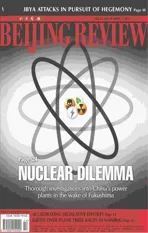Having Second Thoughts
2011-12-24ByJIANGWANDI
By JIANG WANDI
Having Second Thoughts
By JIANG WANDI
In an early morning in July 1945, a strange mushroom cloud arose in the basin of northern New Mexico, the United States, splitting the dark sky with brilliant light. That was not the frst twilight of another day, but the twilight of the atomic age. Dramatically, the frst explosion of a nuclear bomb was tested under the code name,“The Gadget,” by a team of scientists at Los Alamos under their chief Robert Oppenheimer. They were quite confdent that atomic energy, developed either for military or civilian use in the ensuing years, would be well controlled by human beings.
The opposite is true in reality. It is still difficult for ordinary people to tell the difference between a nuclear plant and a nuclear bomb. A number of accidents of radiation leakage have happened in past decades, adding to universal concerns over possible damage to nuclear plants and waste disposal. While some countries refused to approve nuclear industry, others suspended development.
In recent years a golden age for the nuclear power industry has been expected throughout the globe because it was believed to be a good solution to address climate issues. But then the unprecedented nuclear disaster at Japan’s Fukusima plant broke out, caused by an 9.0-magnitude earthquake and the ensuing devastating tsunami.
The year 2011 is the darkest time in the development of the nuclear industry. It becomes even darker when it occurs to us Fukusima happens to coincide with the 25th anniversary of the Chernobyl catastrophe in the former Soviet Union.
Though a small island nation, Japan is a big power in terms of nuclear industry, with more than 20 nuclear power plants—operating or under construction—densely dotting its coasts, because it has limited choices for energy alternatives. China faces an energy problem, too, in spite of the large size of its territory. It has even reached unanimity between the government and the public that developing nuclear industry is a good solution for the country to address electricity shortages and for clean energy endeavors. Also, strongly supporting this policymaking is China’s own expertise in nuclear science. As a member of the world’s nuclear club, it developed an atomic bomb as early as the mid-1960s, and has engaged in the peaceful use of nuclear power ever since.
China started operating its first commercial nuclear station in 1994, and it now has seven nuclear power plants in operation, 11 in construction and 25 planned. All these power plants are located along the eastern coast. As the country’s most populous and prosperous regions, they are naturally more vulnerable to whatever disaster may occur. At the moment, as Japanese engineers are busy watering the burning Fukushima plant, the potential crisis of which is becoming not only a regional but also a global nightmare, China’s decision to suspend approval for new nuclear projects while conducting a thorough check of operational projects is quite right. Yes, we also need to take the heat out of the situation.
